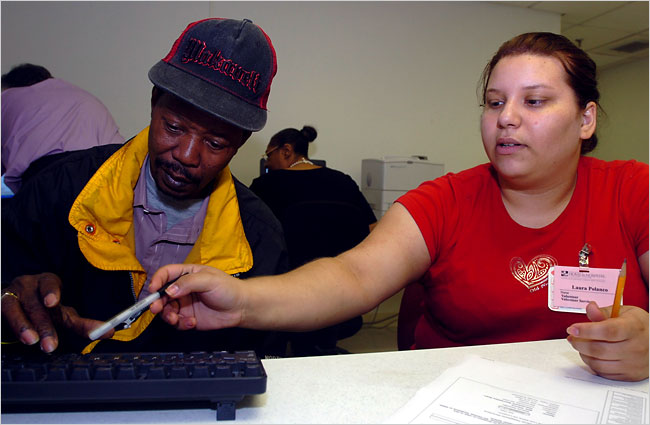|
Out of the Work Force and Into a Classroom
By Matt Villano, The New York Times
October 23, 2007

Computer classes offered by Older Adults Technology Services in New York join students like Gene Pugh, above left, with volunteer teachers like Laura Polanco.
Computer classes offered by Older Adults Technology Services in New York join students like Gene Pugh, above left, with volunteer teachers like Laura Polanco.
At age 83, Irma Morris doesn’t exactly fit the description of a typical student. A resident of San Jose, Calif., she has seven grandchildren. Before her retirement in 1982, she worked nearly 40 years in the cartography industry.
But she has spent more time being scared of new technologies than exploring them. Perhaps this explains why on a recent weekday morning Ms. Morris brought her new Fuji FinePix camera to the first lesson in a five-week workshop about using digital cameras.
The class, run by a nonprofit group called SeniorNet, is the latest in a series of courses at the Cypress Learning Center in downtown San Jose. Ms. Morris says the curriculum has changed her life.
“The computer and all of the other pieces of technology were my husband’s toys, but when he died, I was faced with tackling these things I just didn’t understand,” she said. “Then I started coming here.”
In the two years she has been a widow, Ms. Morris has taken classes on some of the most basic computer skills. She is not alone; in the vein of the 1986 Rodney Dangerfield movie “Back to School,” thousands of retirees are spending their free time returning to classrooms for instruction in everything from operating a mouse to mastering Microsoft Excel.
Such immersion is part of a movement of 60- and 70-somethings to get to know technology. A September report from Jupiter Research, a market research firm in New York, predicted the number of older people using the Internet would rise to 20.1 million by 2010, up from an estimated 11.5 million today.
While senior centers in towns across the country sponsor occasional computer classes, and AARP offers free tutorials online, SeniorNet and another nonprofit organization, Older Adults Technology Services, have particularly transformed the way retirees can broaden their technological horizons.
SeniorNet, for one, has developed a curriculum and taken it national, operating more than 200 computer learning centers in 38 states. Older Adults Technology Services focuses on New York City, and it recently received a $500,000 grant from the City Council to expand its program.
Both groups try to put retirees in learning environments that are comfortable and familiar. In each program, retirees can learn at a relaxed pace, sometimes spending 8 or 10 weeks on word processing, search engines and other aspects of technology that younger people might take for granted.
Kristin Fabos, executive director of SeniorNet, said these hands-on experiences enabled retirees to overcome fears about technology and to use computers to communicate with friends and family members.
“Among retirees and people who don’t use technology every day, there’s this sense that they’re going to push the wrong button and break it,” said Ms. Fabos, whose group is based in San Jose. “These classes are as much about education as they are about getting people accustomed to technology that seems foreign and new.”
The SeniorNet model emphasizes personal attention. Participants pay $40 for an annual membership and $25 a class, and in return are able to enroll in classes with 16 or fewer students. Each class usually has three or four instructors, and most are former SeniorNet students who volunteer to share their knowledge with their peers.
Volunteer teachers also operate the computer centers after hours to help students who come in to practice and try things out.
Don House, who teaches SeniorNet classes at the Almaden Community Center and Library, in Almaden, Calif., said having these resources can be invaluable.
Mr. House, who retired after 15 years at I.B.M., remembered one woman who spent days on a simple assignment, practicing Adobe Photoshop.
“This woman had a terrible time using the typewriter and mouse, but she stuck with it,” he said. “When she finally figured out how to put together a collage, it was like a revelation. She was so excited that she actually managed to figure it out.”
Older Adults Technology Services, known as OATS, offers technology classes that have produced similar epiphanies.
The organization, based in Brooklyn, runs its lessons out of 26 computer labs in housing projects and neighborhood senior centers around the city. Some teachers even make house calls. Last year, for instance, when Diane Sorzano, 71, wanted to learn how to operate the music program Ronimusic, a volunteer tutor came to her Harlem apartment for one-on-one lessons.
“All my life I wanted to learn how to play music, but it wasn’t like I was going to take up a new instrument at my age,” said Ms. Sorzano, who is legally blind and has trouble doing much outside her apartment. “These classes gave me the chance to learn it anyway, and that, to me, is just awesome.”
The OATS program is about to get better. This summer, after hearing about the program, members of the City Council’s Government and Technology Committee approved a $500,000 grant that will allow it to incorporate more teachers and students.
Gale Brewer, chairwoman of the committee, said that considering how many health care organizations are using the Internet, it is critical for retirees to become familiar with technology.
“As we get older, technology gets younger and newer,” she said. “If this isn’t reason enough to stay on top of these kinds of things, I don’t know what is.
More Information on US Elder Rights Issues
Copyright © Global Action on Aging
Terms of Use |
Privacy Policy | Contact
Us
|



